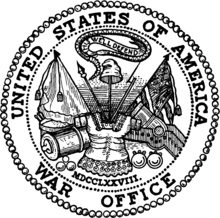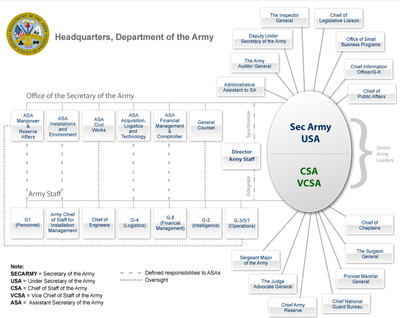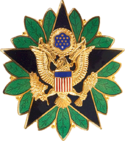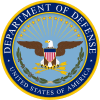 Emblem of the Department of the Army Emblem of the Department of the Army | |
| Agency overview | |
|---|---|
| Formed | July 14, 1775; 249 years ago (1775-07-14) |
| Preceding agency | |
| Headquarters | The Pentagon, Arlington County, Virginia, U.S. |
| Annual budget | $174.7B (FY2022) |
| Agency executives | |
| Parent agency | U.S. Department of Defense |
| Child agency | |
| Website | army.mil |
| United States Armed Forces |
|---|
 |
| Executive departments |
| Staff |
| Military departments |
| Military services |
| Command structure |
| Unified combatant commands |
| Combat support agencies |

The United States Department of the Army (DA) is one of the three military departments within the Department of Defense of the U.S. The Department of the Army is the federal government agency within which the United States Army (U.S.) is organized, and it is led by the secretary of the Army, who has statutory authority under 10 United States Code § 7013 to conduct its affairs and to prescribe regulations for its government, subject to the limits of the law, and the directions of the secretary of defense and the president.
The secretary of the army is a civilian official appointed by the president and confirmed by the Senate. The highest-ranking military officer in the department is the chief of staff of the Army, who is also a member of the Joint Chiefs of Staff. Other senior officials of the department are the under secretary of the Army (principal deputy to the secretary) and the vice chief of staff of the Army (principal deputy to the chief of staff.)
The Department of War was originally formed in 1789 as an Executive Department of the United States and was split by the National Security Act of 1947 into the Department of the Army and Department of the Air Force on September 18, 1947. By amendments to the National Security Act of 1947 in 1949, the department of the Army was transformed to its present-day status.
Organizational structure
Main article: Structure of the United States ArmyThe Department of the Army is a Military Department within the United States Department of Defense. The department is headed by the secretary of the army, who by statute must be a civilian, appointed by the president with the confirmation by the United States Senate. The secretary of the Army is responsible for and has the authority to conduct all the affairs of the Department of the Army, subject to the authority, direction and control of the secretary of defense. The Department of the Army is divided between its headquarters at the seat of government and the field organizations of the Army.
By direction of the secretary of defense, the secretary of the Army assigns Army forces, apart from those units performing duties enumerated in 10 United States Code § 7013 (i.e., organize, train & equip) or unless otherwise directed to the operational command of the commanders of the Combatant Commands. Only the secretary of defense (and the president) has the authority to approve transfer of forces to and from Combatant Commands by 10 United States Code § 162.
Headquarters, Department of the Army

Headquarters, Department of the Army is the corporate office of the department which exercises directive and supervisory functions and consists of two separate staffs: the Office of the Secretary of the Army (10 United States Code § 7014), the mainly civilian staff; and the Army Staff (10 United States Code § 7031, & 10 United States Code § 7032), the mainly military staff. The Office of the Secretary and the Army Staff are organized along similar lines, with civilians and military officers both overseeing similar program areas.
Office of the Secretary
The Office of the Secretary is led by the secretary of the Army, assisted by the under secretary of the Army and the administrative assistant to the secretary of the Army, who is the senior civilian career official of the department. The Office of the Secretary of the Army, also known as the Army Secretariat, is divided into multiple branches with functional responsibilities, the six most important of which are headed by one of the five assistant secretaries of the Army or the general counsel of the Army, each of whom are civilians appointed by the president and confirmed by the Senate.
The Army Staff

The Army Staff is led by the chief of staff of the Army, a four-star general who is the highest-ranking officer in the Army and the Army member of the Joint Chiefs of Staff. The chief of staff is assisted in managing the Army Staff by the vice chief of staff of the United States Army, a four-star general and second highest-ranking officer in the Army. The Army Staff is divided into several directorates, each headed by a three-star general; a deputy chief of staff (DCS G–1 (personnel), G–2 (intelligence), G–3 (operations), G–4 (logistics), G-5 (planning), G-6 (network), G-7 (training), G-8 (finance), and G-9 (installations) respectively). The DCS G-3/5/7 is a single office for operations, plans, and training.
A key official within the Army Staff is the director of the Army Staff, who is a three-star general. The director is responsible for integrating and synchronizing the work of the Office of the Secretary and the Army Staff so that they meet the goals and priorities of the secretary of the Army. Other key figures within the Army Staff are the sergeant major of the Army, the Army Staff Senior Warrant Officer, the Chief Warrant Officer of the Army, the United States Army judge advocate general, the chief of the Army Reserve, the United States Army provost marshal general, and the United States Army surgeon general. The chief of the National Guard Bureau was previously considered part of the Army Staff, but has been elevated to four-star rank and membership in the Joint Chiefs of Staff; the director of the Army National Guard and the director of the Air National Guard (both three-star positions) report to the chief, National Guard Bureau for strategy and policy, but receive funding and Service-specific guidance from their respective services, as they have different legal authorities.
Army commands and Army service component commands
![]() Headquarters, United States Department of the Army (§ HQDA):
Headquarters, United States Department of the Army (§ HQDA):
Source: U.S. Army organization
See also
- Department of the Air Force
- Department of the Navy
- National Guard Bureau
- Office of the Secretary of Defense
- Office of the Chief Legislative Liaison (United States Army)
- Title 32 of the Code of Federal Regulations
Notes
- Understanding the Army Requirements Oversight Council (AROC) See Joint Requirements Oversight Council
References
- ^ 10 U.S.C. § 7013
- 10 U.S.C. § 162
- 10 U.S.C. § 7014
- 10 U.S.C. § 7031
- 10 U.S.C. § 7032
- Army Publishing Directorate sample search: AR 5-22 AR 5-22 — The Army Force Modernization Proponent System Army Publications Home page
- Army Strategy Note (ASN) proponent: G-3/5/7 (LTG James E. Rainey) (1 April 2022) INSTITUTIONAL STRATEGY SD 12 STRATEGY NOTE 2022-04, should be read in conjunction with How the Army Runs
- US Army War College (USAWC) School of Strategic Landpower (2019-2020) How the Army Runs: a senior leader reference handbook 32nd edition. 560 pages
- ^ Carter, Charles F. Jr.; Archer, Mark A.; Murray, Albert E. (July 1988). "Description of Army Staff Functions: Targets for Planning Aids" (PDF). Archived from the original (PDF) on March 4, 2017.
- "NATO SHAPE structure". nato.int. Archived from the original on 9 January 2010.
- United States Code (1956) TITLE 10 AND TITLE 32, UNITED STATES CODE
- (13 November 2020) Army General Order NO. 2020–31: Redesignation of United States Army Europe as United States Army Europe and Africa AND Redesignation of United States Army Africa/Southern European Task Force as United States Army Southern European Task Force, Africa
- "Commanding General - Biography".
- "General Orders No. 2012-02: Redesignation and Assignment of Eighth Army as a Subordinate Command of The United States Army Pacific" (PDF). Department of the Army. Archived from the original (PDF) on 4 March 2016.
- McHugh, John H. (21 November 2014). "Designation of Arlington National Cemetery and Soldiers' and Airmen's Home National Cemetery as a Direct Reporting Unit" (PDF). Department of the Army. Archived from the original (PDF) on 3 February 2015. Retrieved 7 February 2015.
- Straehley, Steve (May 7, 2017). "Superintendent of Arlington National Cemetery: Who Is Kate Kelley?". AllGov. Retrieved 13 December 2018.
- "Leaders". United States Army Acquisition Support Center.
- DAGO 2017-03, DESIGNATION OF THE UNITED STATES ARMY CIVILIAN HUMAN RESOURCES AGENCY AND ITS SUBORDINATE ELEMENTS AS DIRECT REPORTING UNIT, apd.army.mil, dated 4 January 2017, last accessed 13 January 2017
- "Welcome to CHRA - About Us". chra.army.mil. Retrieved 22 January 2021.
- "Lieutenant General Scott A. Spellmon". www.usace.army.mil.
- Rachel Nostrant (17 Sep 2021) Civilian boss takes charge of Army CID for first time United States Army Criminal Investigation Division is better known as CID
- CID Command Group
- "HRC Leadership". hrc.army.mil. Retrieved 22 January 2021.
- "U.S. Army Intelligence and Security Command | INSCOM". www.army.mil.
- Lindsey Monger (July 21, 2020) Change of command ceremony marks change in ATEC leadership
- MG Joel K. Tyler command of ATEC June 7, 2018 Archived 15 August 2018 at the Wayback Machine
- Organization, United States Army
Bibliography
- Army General Order NO. 2020-01: ASSIGNMENT OF FUNCTIONS AND RESPONSIBILITIES WITHIN HEADQUARTERS, DEPARTMENT OF THE ARMY, Accessed on 2021-01-22.
- Army Regulation 10–87, Army Commands, Army Service Component Commands, and Direct Reporting Units, Accessed on 2021-01-22.
External links
- Army.mil
- Department of the Army in the Federal Register
- Department of Defense on USAspending.gov
- Understanding the Army's Structure
| United States Armed Forces | |||||||||||||
|---|---|---|---|---|---|---|---|---|---|---|---|---|---|
| |||||||||||||
| Leadership |
| ||||||||||||
| Components |
| ||||||||||||
| Structure | |||||||||||||
| Operations and history |
| ||||||||||||
| Personnel |
| ||||||||||||
| Equipment |
| ||||||||||||
| Federal executive departments of the United States of America | |
|---|---|
| Current | |
| Former | |
